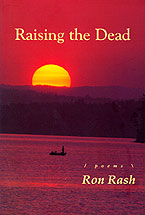Plagiarist.com Articles
Ron Rash's Raising the Dead
Raising the Dead
by Ron Rash
64 pages | PB $12.00 | Iris Press | 2002
ISBN: 091607854X | Order from Amazon.com
Raising the Dead, Ron Rash's third book of poetry in just five years, is a masterpiece. It's a rare perfect volume of poetry that hits all the right notes and hits them dead-on. While the poems aren't necessarily a series, they fit together and accrue as a whole, with each poem deepening the meaning of the others.
The poems are mostly about the Jocassee River Valley in South Carolina, and how the building of what would become the Jocassee Reservoir affected the inhabitants. Rash's family history in this area extends for several generations, and many of the poems are infused with the heartbreak and tragedy of the upheaval created when this technological giant, the Duke Power Company, comes in contact with the natural world and the people who have for centuries lived in it. From Rash's brief notes:
Without editorializing or being overly preachy, Rash depicts the effects of both the displacement of the residents and the denial of the region's dead to have their remains deposited in the same land that they lived on all their lives. If I had to sum up the overall theme of the book it would be "loss" and how people of the Appalachians - the living, deal with the loss of their land, their family members, their identity, and their dead.
The book is broken up into five sections - the first and last most directly related to the Reservoir and the inner three dealing with the people of the region.
Each of the five sections ends with a lyrical coda that beautifully relates to the poems in the preceding section, deepening their meaning. The tone of these codaic poems is gentle, reflective, and in effect, like a prayer.
The book opens with a poem about the displacement of the graveyards and the violation of the holy land in which the dead were buried:
Last Service Though cranes and bulldozers came, yanked free marble and creek stones like loose teeth, and then shovels unearthed coffins and Christ's stained glass face no longer paned windows but like the steeple, piano, bell, and hymnals followed that rolling graveyard over the quick-dying streams, the soon obsolete bridges— they still congregated there, wading then crossing in boats those last Sunday nights, their farms already lost in the lake, nothing but that brief island left of their world as they lit the church with candles and sang from memory deep as water old hymns of resurrection before leaving that high ground where the dead had once risen.
This final service must've felt like a terrible final blow - they'd already lost their farms to "the lake" and now are losing a bit of their heritage, in seven-syllable lines, paying homage to not only the bodies, but the souls of their ancestors. Rash's approach throughout Raising the Dead is so even-handed - he's not here to pass judgment but to be a witness. Rash's tact isn't "This is wrong." as much as "I was there. This is what happened."
I don't know if Rash was a witness to these events or not - that's irrelevant - but the speakers of his poems were, and what they do and say is the subject of this book.
Rash's poetry is formal without being stolid. Every phrase flows so naturally that I didn't even realize that many of the poems were even written in form until I revisited the book to write this review.
One of the stronger poems in the book is the villanelle "In Dismal Gorge." The repeated phrases "The lost can stay lost down here" and "Too much too soon disappears" gain resonance through their repetition, and are profound enough to warrant repeating. The villanelle is a difficult form to make work because of its repetition - in Rash's "In Dismal Gorge" the repeated phrases are gorgeous (excuse the pun) and even the seven-syllable line (in contrast with other villanelles written in iambic pentameter, like Dylan Thomas's " Do Not Go Gentle Into That Goodnight") echoes the loss felt by its shortness.
In Dismal Gorge The lost can stay lost down here, in laurel slicks, false-pathed caves. Too much too soon disappears. On creek banks clearings appear, once homesteads. Nothing remains. The lost can stay lost down here, like Tom Clark's child, our worst fears confirmed as we searched in vain. Too much too soon disappears. How often this is made clear where cliff-shadows pall our days. The lost can stay lost down here, stones scattered like a river in drought, now twice-buried graves. Too much too soon disappears, lives slip away like water. We fill our Bibles with names. The lost can stay lost down here. Too much too soon disappears.
The line "lives slip away like water" is deepened by the knowledge that while the lives slip away like water it is the water itself that caused the dead to be scattered in "twice-buried graves."
The cover features a gorgeous photo of the Jocassee Reservoir at sunset by South Carolina photographer Bill Barley that gains resonance when we consider what that water represents.
The people who lived in the Jocassee Valley are gone now, supplanted by the Reservoir that supplies power to the area. As the old way of life disappeared, so the old places were subsumed by the encroachment of technology into even the most remote of places. What Raising the Dead achieves is astounding - it gives voice to the silent, the displaced, and the dead.
![[home]](http://plagiarist.com/images/home.gif)
